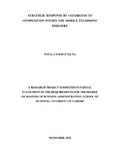| dc.description.abstract | Competition in the telecommunication industry causes firms to develop new products and services, which give consumers greater selection and better products. Strategic response to competition is key as businesses seek to gain competitive advantage and remain relevant in the market and by large the environment. What is required in strategic response is a structured, disciplined, systematic way of surviving an operational environment characterized by aggressive competition. The aim of the study was to establish the strategic response by Safaricom to address competition within the mobile telephone industry.
The study was guided by the following research objective: To find out the strategic response by Safaricom to address competition within the mobile telephone industry. This study used case study design which usually focuses on a contemporary phenomenon in its real-life context. Purposive sampling was used to select the six different managers interviewed for the research. The data was collected through use of interview guide. Content analysis was used to analyze the data and the findings presented and discussed.
The study established that formulation of strategies to counter competition at Safaricom was chiefly influenced by meeting the needs, wants and providing benefits for the customers, status of competing forces in the market environment and successes and failures of strategies previously followed by the firm. The strategies enabled the company to counter competition in that they assist the company to adapt to the changing business environment, steer the company on ways to raise incomes rapidly than its competitors. The outcome of these strategies was eminent in terms of being steps ahead of competitors in market share and profits.
The challenges facing Safaricom during strategic response to competition included unpredictable government interference, market environment, complexities during implementation of the strategies, high risks involved in the diversification of strategy, weak financial management policies and contradiction between leadership style and management orientation. The study concluded that strategies formulated enabled the company to remain ahead on emerging trends in the local and regional market, to learn specific customer demands and attend to them sufficiently and to enable the company to device unique products and services that distinguish them from other players in the market. | en_US |

